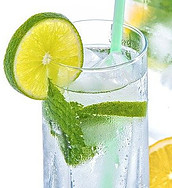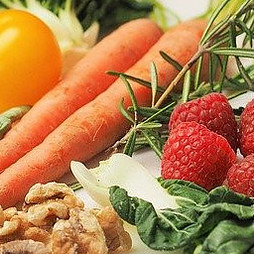One of the cornerstones of good health is what you eat. You need good nutrition to provide the necessary materials for your body to function and repair itself. Being healthy isn’t about following the latest diet craze. It isn’t about being skinny. And it isn’t just about eating “superfoods”. So, let’s explore what is eating healthy food.
Drink water – your life depends on it!
You need to drink water to live. Your body is about 60% and all your cells and blood are mostly water. Your cells are like a goldfish in a bag of water – no water means no functioning goldfish. Water also helps to regulate your body temperate and remove waste from your body. Drink about half your body weight (in lbs) in water (in oz). For example, if you are 100lbs, drink about 50oz of water. In kilograms, drink at least 30ml per kilo of body weight.

The key to eating healthy food – quality affects your health
Natural whole foods are nutrient-dense containing phytonutrients, enzymes, antioxidants, fibre, vitamins, minerals, amino acids – essentially, all the things you need to keep your body working like it should. The more a food has been processed, the less nutrition and fibre it will have. Sometimes nutrients are added to boost the nutritional value but it is still a processed food. 
Some foods are higher in pesticide residues than other foods. The Environmental Working Group in the United States puts out the Clean 15 Dirty Dozen which is a list of commonly purchased produce with the lowest pesticide residue (Clean 15) and 12 with the highest. This list is updated every year and is specific to the US. I don’t think other countries have this kind of information publicly available but I expect that if similar farming methods are used, the high pesticide produce may be similar to the EWG list. For the full list of high pesticide produce, check out the EWG’s Shopper’s Guide to Pesticides in Produce™.
Get the Dirty Dozen organic if possible. The Clean 15 will be okay even if conventionally grown. Farmers’ markets may have organically grown produce even though it it not certified organic – ask questions and make up your own mind.
Organic is best but of course non-organic whole food is still better than junk food or no food.
Look for pastured or grass-fed organic meat and free range eggs.
Fish is a great source of protein and omega-3 however fish should be wild caught. Avoid large fish which may have higher levels of mercury. Good options are anchovies, mackerel, catfish, cod, haddock, hake, herring, perch, salmon, sardines, sole, trout. For a comprehensive list of mercury levels in different types of fish, see the NRDC’s smart seafood buying guide
Seed and nut oils go rancid when heated to high temperatures so use those as dressings. For cooking oils, use ghee (clarified butter from which the milk solids have been removed so it’s lactose free) or coconut oil for a vegan option. Ghee and coconut oil are solid at room temperature (unless you live in a hot climate) but liquid when warmed, so you may need to warm them a little first if you need a liquid.
Macros for optimal health
In very simple terms,
- Carbohydrates provide glucose for quick energy which is critical for your brain;
- Proteins provide amino acids which are the building blocks of muscle, hormones and neurotransmitters;
- Fats support healthy brain and nervous system function.
Within each group, some choices are better than others. For example, plant-based oils are generally a better fat option than animal fats. Some fruit and vegetables have a higher impact on your blood sugar (like watermelon and baked potatoes which have a high glycemic index) than others (like apples, grapefruit, carrots which have a low glycemic index). Pastured, grass-fed animal proteins are better choices. Wild caught fish have lower levels of mercury than farmed fish (try wild caught Atlantic salmon, sardines, trout, mackerel, cod).
Too much of anything is not good. Excess carbs can lead to high blood sugar and unhealthy weight gain. Too much protein puts a strain on your liver and kidneys. Too much fat could lead to inflammation and health issues like cardio-vascular disease, stroke, etc.
So how much should you eat?
If you look at healthy diets from around the world where people are the healthiest, daily macros should be consumed in the following proportions:
- Carbohydrates: 40% – 70% (from fruit, vegetables, starches and grains)
- Protein: 10% – 20% (healthy animal or plant sources)
- Fat: 10% – 30% (healthy fats)
It is recommended that you should have 7 – 9 cups of fruit and vegetables a day.
What does this

Jennifer Tak is a certified Integrative Health Practitioner & Energy Coach who helps busy professionals regain their energy and conquer stress, gently and naturally. Jennifer had over 20 years of corporate life and was stressed out and exhausted. Now she’s using her previous corporate experience, combined with her hippy inclinations with health and energy medicine to simplify health for busy people. Get a FREE copy of her Stress Relief e-Book for 15 ways to reduce your stress quickly, gently and naturally.


I really like your article, it’s focused and well explained. I can share from my experience that when I started to eat more healthily and to drink more water my general health and mood improved significantly. I didn’t change my lifestyle significantly but really felt the impact of taking care a bit more. I hope you’ll reach out to more people and it would help them to improve their lives.
Thank you Yana! Even small steps towards a healthier lifestyle helps.
Hi Jenny,
This is a great article very educational, drinking water is really important and I personally need to increase my intake, this is not easy when you work as an engineer, as some times you will not be in the right location or position to get that top up of water. What would you suggest ? is it ok to drink more water in one go or drink small amounts throughout the day and will I get the same benefits?
Good advice about organic foods and I have noticed more shops are now selling organic foods, its also great if you are able to grow your own.
I did like your section on too much of carbs, protein, and fat. The outcomes are worrying and I will keep an eye on those levels
Great Article, All the best
Wince
Thank you Wince. Try drinking at least 1 – 2 cups of water when you wake up and keep a water bottle with you so you so you can have some whenever you can. If you drink it all at once, you’d probably need to go to the bathroom straight away and then feel thirsty the rest of the day. Don’t drink at meal times as this dilutes your digestive juices which makes it harder to digest your food. Best to drink water at least 30 minutes before a meal and then 1 – 2 hours after.
Good day, I’m pleased to come across this important information. Well, we may all want to eat healthy food but may not know what and how much. Having read this post has given me all I need so that I can keep my body healthy when it comes to diet. I have shared this information to my friend, this is so crucial. Thanks for sharing.
Hi Kokontala! I’m so glad you found it useful. It’s so important for us to take care of our health earlier rather than later. Thank you for sharing it – we all need to help each other get healthier. Eat well!